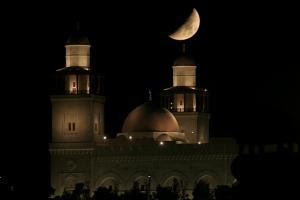February 7th, 2008, filed by Tom Heneghan

Mike Ghouse : To be a Muslim is to be a peace maker; one who constantly seeks to mitigate conflicts and nurtures goodwill for the purpose of co-existence of God’s creation to be in peace and Harmony. Indeed that is the chief purpose of religion, any religion. Dialogue is the first step towards peace. No matter how many times failures may dawn upon us, dialogue is the right thing to do. Through a dialogue, each party becomes a genunine owner partner to the peace , and when you are an owner, it becomes your duty to safegaurd the committments. May God bless them and all such endeavors for world peace – simply translated: you and I can live without fear for the rest of our lives.
Preparations are under way for a planned visit to the Vatican by representatives of the “Common Word” Muslim appeal for a theological dialogue between Christianity and Islam. This group of Muslim scholars and leaders got to be known as the “138″ because that was the number of initial signatories, but the total has grown to 221, so that label is a bit confusing now. Anyway, veteran vaticanista Sandro Magister informs us that five Muslim representatives were at the Vatican early this week to start preparing for the visit expected to take place in the next month or so. One interesting aspect is simply the geographical mix of people involved — they come from Turkey, Britain, Jordan, Libya and Italy.
Discussion of this initiative continues apace.
The conservative U.S. Catholic author George Weigel argues that the”Common Word” authors “seemed to be trying to change the subject” in their statements about the planned dialogue because they did not address what Pope Benedict cited as discussion points when he addressed the Roman Curia in December 2006. In that speech, Benedict said Muslims and Christians had to “counter a dictatorship of positivist reason that excludes God from the life of the community and from public organizations” and “welcome the true conquests of the Enlightenment, human rights and especially the freedom of faith and its practice, and recognise these also as being essential elements for the authenticity of religion.”
In his weekly column, the National Catholic Reporter’s Vatican expert, John Allen, has a long interview with Father Thomas Michel S.J., one of the Catholic Church’s leading experts on Islam. Allen notes two interesting points Michel makes:
· Michel said: “It’s about time that somebody moved the conversation off geopolitical conflicts and onto faith questions.” Although some Vatican officials have argued that inter-religious dialogue ought to be seen as part of a broader dialogue among cultures, Michel said he doesn’t share that view. “Religion is already too often relegated to the status of folklore, of being a mere artifact of culture,” he said. “Muslims are making us all aware that if we’re not talking directly about God and religion, we’re not accomplishing anything.”
· I asked Michel to comment on one issue certain to surface in any Muslim-Christian conversation: “reciprocity,” or the insistence that if Muslim immigrants in the West receive the benefit of religious freedom and protection of law, Christian minorities in the world’s 56 Muslim-majority states ought to get the same deal. “We have to be careful,” Michel said. “Reciprocity is not a gospel value, but something that comes out of diplomatic and trade negotiations.” It was entirely appropriate, Michel said, to insist that Muslims treated minorities fairly. On the other hand, he said, respect for human dignity could not become a bargaining chip.
Sohail Nakhooda, editor-in-chief of Islamica magazine, kept the focus on what Muslims and Christians have in common. He made two interesting points about that in an interview for the Venice-based journal Oasis :
· “The document definitely caught people by surprise, particularly the naysayers in both religions who prefer to keep complete theological distance to legitimise their polemics … the document generated dialogue within and between communities. Its aim is not to whittle away differences in doctrine or, say, soteriology, but it is more about a recognition that we need to retrieve and learn to appreciate shared history and shared theological principles.
· “What is innovative and seminal about ‘A Common Word’ is that it starts from unity and moves to difference, rather than from difference to unity. It began with unity, that is, with what both communities shared deeply. That unity, or sharedness, was to be the basis for difference. This is an altogether different way of approaching the problem of intercultural relations and of plurality; it preserves their religious and cultural identities; it enables each to come together on solid theological grounds whose basis are in their own scriptures and which both share. They may disagree, and naturally they will, but when dialogue is based on the dual principles of love of God and of neighbour, it will ensure that they always leave as friends and that their disagreement does not escalate into all-out conflict.”
It’s interesting to see some people such as Weigel pointing to a large gap between Christianity and Islam and others like Nakhooda stressing what links them. Which approach do you think is more realistic or has more chance of fostering understanding?
